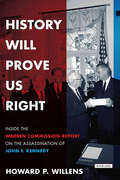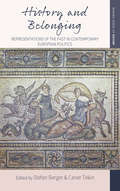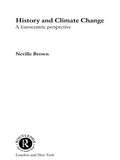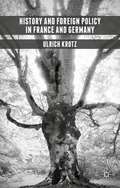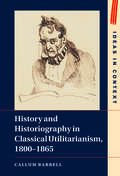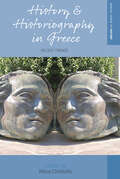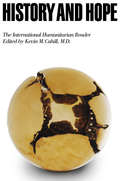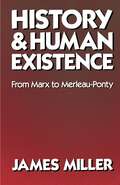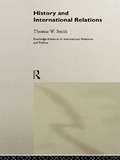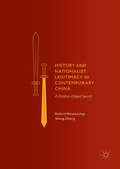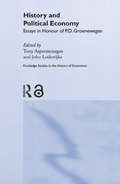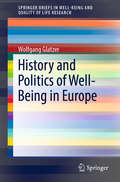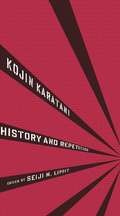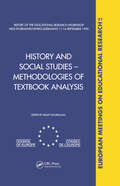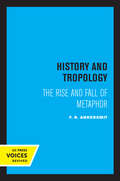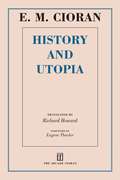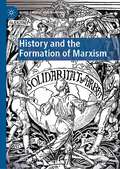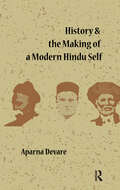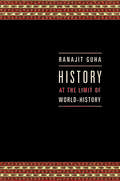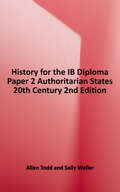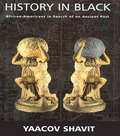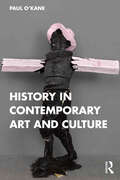- Table View
- List View
History Will Prove Us Right: Inside the Warren Commission Report on the Assassination of John F. Kennedy
by Howard P. WillensIn this &“illuminating&” insider account &“Willens covers all his bases [in] a chapter-by-chapter breakdown of the [Warren] commission report.&” (Publishers Weekly) Everything was over in seconds, but the events of November 22, 1963 have been debated for more than five decades. The presidential commission tasked with finding the truth about the Kennedy assassination, headed by then-Chief Justice Earl Warren, concluded that Oswald had acted alone. But the report did little to quell conspiracy theorists. Warren himself calmly dismissed the criticism, assuring his fellow commission members that &“history will prove that we are right.&” This eye-opening account by Howard P. Willens, one of the few living staff members of the Warren Commission, reveals that Warren's words were prescient. Drawn from Willens' own journals and extensive notes on the investigation, History Will Prove Us Right tells the complete story of every aspect of the investigation into one of the century's most controversial events from a uniquely first-person perspective. &“Fascinating . . . Many will still disagree with the Warren Commission&’s conclusion, but this book serves a valuable function by laying out how it did its work.&” —Booklist &“ A behind-the-scenes take on the investigation, its personalities and methodology. One by one [Willens] discards alternatives to the lone gunman theory.&” —The Guardian &“The commission got it right — Oswald was the sole assassin —and that conclusion holds up after 50 years of scrutiny.&” —The Washington Post &“Willens's account deserves close and careful scrutiny by anyone interested in the Kennedy assassination.&” —Library Journal &“A superbly written account by someone who knows precisely what needs to be said and how to say it.&” —Kirkus Reviews
History and Belonging: Representations of the Past in Contemporary European Politics (Making Sense of History #33)
by Stefan Berger Caner TekinIn cultural and intellectual terms, one of the EU’s most important objectives in pursuing unification has been to develop a common historical narrative of Europe. Across ten compelling case studies, this volume examines the premises underlying such a project to ask: Could such an uncontested history of Europe ever exist? Combining studies of national politics, supranational institutions, and the fraught EU-Mideast periphery with a particular focus on the twentieth century, the contributors to History and Belonging offer a fascinating survey of the attempt to forge a post-national identity politics.
History and Belonging: Representations of the Past in Contemporary European Politics (Making Sense of History)
by Stefan Berger and Caner TekinIn cultural and intellectual terms, one of the EU’s most important objectives in pursuing unification has been to develop a common historical narrative of Europe. Across ten compelling case studies, this volume examines the premises underlying such a project to ask: Could such an uncontested history of Europe ever exist? Combining studies of national politics, supranational institutions, and the fraught EU-Mideast periphery with a particular focus on the twentieth century, the contributors to History and Belonging offer a fascinating survey of the attempt to forge a post-national identity politics.
History and Climate Change: A Eurocentric Perspective (Routledge Studies in Physical Geography and Environment)
by Neville BrownHistory and Climate Change is a balanced and comprehensive overview of the links between climate and man's advance from early to modern times. It draws upon demographic, economic, urban, religious and military perspectives. It is a synthesis of the many historical and scientific theories, which have arisen regarding man's progress through the ages.Central to the book is the question of whether climate variation is a fundamental trigger mechanism from which other historical sequences develop, or one amongst a number of other factors, decisive only when a regime/society is poised for change. Evidence for prolonged climate change is not that extensive. But it is clear that climatic variation has regularly played a part in historical development. Paricular attention is here paid to Europe since AD 211.Cold and warmth, wetness and aridity can create contrary reactions within societies, which can be interpreted in vary different ways by scholars from differenct disciplines. Does climate change exacerbate famine and epidemics? Did climate fluctuation play a part in pivotal historical events such as the mass exodus of Hsuing-nu from China, the pressure of the Huns on the Romans and the genesis of the Crusades? Did the bitter Finnish winter of 1939-40 ensure the ultimate defeat of Hitler? These episodes, and many others are discussed throughout the book in the authors distinctive style, with maps and photographs to illustrate the examples given.
History and Foreign Policy in France and Germany
by Ulrich KrotzWhy do states similar in size, resources and capabilities significantly differ in their basic orientations and actions across major domains in foreign policy, security and defense? This book addresses this important question by analyzing the major differences between the foreign policies of France and Germany over extended periods of time.
History and Historiography in Classical Utilitarianism, 1800–1865 (Ideas in Context #136)
by Callum BarrellThis first comprehensive account of the utilitarians' historical thought intellectually resituates their conceptions of philosophy and politics, at a time when the past acquired new significances as both a means and object of study. Drawing on published and unpublished writings - and set against the intellectual backdrops of Scottish philosophical history, German and French historicism, romanticism, positivism, and the rise of social science and scientific history - Callum Barrell recovers the depth with which Jeremy Bentham, James Mill, George Grote, and John Stuart Mill thought about history as a site of philosophy and politics. He argues that the utilitarians, contrary to their reputations as ahistorical and even antihistorical thinkers, developed complex frameworks in which to learn from and negotiate the past, inviting us to rethink the foundations of their ideas, as well as their place in - and relationship to - nineteenth-century philosophy and political thought.
History and Historiography in Greece: Recent Trends (Making Sense of History)
by Nikos ChristofisAn updated guide to Greek historiography was long overdue. In this comprehensive and temporally wide-ranging reassessment, History and Historiography in Greece examines the evolution of Greek historical scholarship by reviewing the ideas, methods, and schools of history shaping the field. From how these developments correspond with international trends, to their rate of development alongside global shifts in scholarship, this volume identifies not only the ideological limitations shaping Greek academia, but also the innovations that are breaking new ground. In doing so, the contributors illuminate how those developments yield new lessons for existing conceptual frameworks within the fields of labor, gender, diaspora studies, and more.
History and Hope: The International Humanitarian Reader (International Humanitarian Affairs)
by Kevin M. CahillHistory and Hope: The International Humanitarian Reader provides a better understanding—both within and outside academia—of the multifaceted demands posed by humanitarian assistance programs. The Reader is a compilation of the most important chapters in the twelve-volume International Humanitarian Affairs book series published by Fordham University Press. Each selected chapter has been edited and updated.In addition, the series editor, Kevin M. Cahill, M.D., has written, among other chapters, an introductory essay explaining the academic evolution of the discipline of humanitarian assistance. It focuses on the “Fordham Experience”: its Institute of International Humanitarian Affairs (IIHA) has developed practical programs for training fieldworkers, especially those dealing with complex emergencies following conflicts and man-made ornatural disasters.
History and Human Existence—From Marx to Merleau-Ponty
by James MillerFrom the Introduction:The present essay provides an introduction to the treatment of human existence and individuality in Marxist thought. The work will be primarily concerned with two related topics: the evaluation by Marxists of individual emancipation and their assessment of subjective factors in social theory. By taking up these taking up these topics within a systematic and historical framework, I hope to generate some fresh light on several familiar issues. First, I pursue a reading of Marx focused on his treatment of subjectivity, individuation, and related methodological and practical matters; second, I apply this interpretation to analyzing the dispute between Marxist orthodoxy and heterodoxy over such matters as class consciousness and the philosophy of materialism; finally, I employ this historical context to clarify the significance of "existential Marxism," Maurice Merleau-Ponty's and Jean-Paul Sartre's contribution to Marxist thought.
History and International Relations: History's Revenge And Future Shock (Routledge Advances in International Relations and Global Politics #97)
by Thomas W. SmithThis book is a major contribution to the debate about philosophy and method in history and international relations. The author analyses IR scholarship from classical realism to quantitative and postmodern work.
History and Language in the Andes
by Paul Heggarty Adrian J. PearceThis book gathers ground-breaking, explicitly inter-disciplinary essays examining the Andean past, including history, languages, anthropology, and ethnohistory.
History and Nationalist Legitimacy in Contemporary China
by Qiang Zhang Robert WeatherleyThis book examines how the Chinese Communist Party (CCP) has attempted to bolster its nationalist legitimacy through the utilisation of Chinese history. The authors identify two different modes of nationalism - aggressive and consensual - both of which are linked to the historical memory of the late Qing Dynasty and Republican era. Aggressive nationalism dwells on China's traumatic "century of humiliation" and is intended to incite popular resentment towards former imperialist powers (particularly Japan and the US) whenever they are deemed to still be acting in a provocative manner in their dealings with China. The aim is to remind the Chinese people that the CCP liberated China from imperialism after 1949 and has since restored national pride. Consensual nationalism is more conciliatory, emphasising common historical ties with the Guomindang (KMT) during the Second Sino-Japanese War and the Republican era. Here, the CCP is trying to promote itself as the party of national harmony and unity, with the long-term objective being peaceful reunification with Taiwan. However, the public response in China has not always been supportive of the CCP's claims to be the sole defender of Chinese national interests. Some critics have suggested that China would have been better off if the KMT had won the civil war instead of the CCP. Others have insisted that the party is hopelessly weak on issues of national importance and that China is no stronger now than it was during the final throes of the much-hated Qing Dynasty. This book will be of interest to research students and scholars of Chinese politics, history and international relations.
History and Neorealism
by Ernest R. May Richard Rosecrance Zara SteinerNeorealists argue that all states aim to acquire power and that state cooperation can therefore only be temporary, based on a common opposition to a third country. This view condemns the world to endless conflict for the indefinite future. Based upon careful attention to actual historical outcomes, this book contends that while some countries and leaders have demonstrated excessive power drives, others have essentially underplayed their power and sought less position and influence than their comparative strength might have justified. Featuring case studies from across the globe, History and Neorealism examines how states have actually acted. The authors conclude that leadership, domestic politics, and the domain (of gain or loss) in which they reside play an important role along with international factors in raising the possibility of a world in which conflict does not remain constant and, though not eliminated, can be progressively reduced.
History and Political Economy: Essays in Honour of P.D. Groenewegan (Routledge Studies in the History of Economics)
by Tony Aspromourgos John LodewijksImpressive and authoritative, this essential book brings together a collection of essays in honour of Peter Groenewegen, one of the most distinguished historians of economic thought of a generation. His work on a wide range of economic theorists such as Adam Smith, François Quesnay and Alfred Marshall approaches a level of near insuperability.
History and Politics of Well-Being in Europe (SpringerBriefs in Well-Being and Quality of Life Research)
by Wolfgang GlatzerThis book presents a reconstruction of the history of well-being on the European continent with special attention to the European Union, as people from Europe have a history of a long-term march towards well-being. It discusses ancient civilizations on the European continent, which have contributed significantly to the features of well-being in contemporary Europe. Following Europe`s success over the past millennium, which brought the continent a unique rise to better well-being it also imposed new challenges for sustaining well-being and alleviating misery. It is shown that Europeans attained a high level of well-being in global comparison, yet their attitudes remained at the same time ambivalent and precarious. Significant parts of the population claim a low well-being and suffer from the difficulties of life. Even though a top ranked area of socio-economic development in the world, this book shows that poverty, inequality and hardship remain stable structural problems which have to be overcome in order to avoid significant restrictions for a broad quality of life. But despite all their burdens and hardships, Europeans are among the most prosperous and privileged people in the world.
History and Repetition (Weatherhead Books on Asia)
by Kojin KarataniKojin Karatani wrote the essays in History and Repetition during a time of radical historical change, triggered by the collapse of the Cold War and the death of the Showa emperor in 1989. Reading Karl Marx in an original way, Karatani developed a theory of history based on the repetitive cycle of crises attending the expansion and transformation of capital. His work led to a rigorous analysis of political, economic, and literary forms of representation that recast historical events as a series of repeated forms forged in the transitional moments of global capitalism.History and Repetition cemented Karatani's reputation as one of Japan's premier thinkers, capable of traversing the fields of philosophy, political economy, history, and literature in his work. The first complete translation of History and Repetition into English, undertaken with the cooperation of Karatani himself, this volume opens with his innovative reading of The Eighteenth Brumaire of Louis Bonaparte, tracing Marx's early theoretical formulation of the state. Karatani follows with a study of violent crises as they recur after major transitions of power, developing his theory of historical repetition and introducing a groundbreaking interpretation of fascism (in both Europe and Japan) as the spectral return of the absolutist monarch in the midst of a crisis of representative democracy. For Karatani, fascism represents the most violent materialization of the repetitive mechanism of history. Yet he also seeks out singularities that operate outside the brutal inevitability of historical repetition, whether represented in literature or, more precisely, in the process of literature's demise. Closely reading the works of Oe Kenzaburo, Mishima Yukio, Nakagami Kenji, and Murakami Haruki, Karatani compares the recurrent and universal with the singular and unrepeatable, while advancing a compelling theory of the decline of modern literature. Merging theoretical arguments with a concrete analysis of cultural and intellectual history, Karatani's essays encapsulate a brilliant, multidisciplinary perspective on world history.
History and Social Studies
by Hilary BourdillonFirst published in 1992. This volume includes reports, papers and discussion from a September 1990 educational research workshop on textbook analysis in history and social studies. Some 20 European countries are represented.
History and Tropology: The Rise and Fall of Metaphor
by F. R. Ankersmit"The chief business of twentieth-century philosophy" is "to reckon with twentieth-century history," claimed R. G. Collingwood. In this remarkable collection of essays, Frank Ankersmit demonstrates the prescience of that remark and goes a long way toward meeting its challenge. Responding to the work of Hayden White, Arthur Danto, and Hans-Georg Gadamer, he examines such issues as the difference between historical representation and artistic expression, the status of metaphor in historical description, and the relation of postmodernism to historicism. Ankersmit's fluent grasp of European thought and his ability to incorporate concepts from literary theory, art history, the philosophy of science, and political thought into his analyses assure that this collection will interest readers throughout the humanities. This title is part of UC Press's Voices Revived program, which commemorates University of California Press’s mission to seek out and cultivate the brightest minds and give them voice, reach, and impact. Drawing on a backlist dating to 1893, Voices Revived makes high-quality, peer-reviewed scholarship accessible once again using print-on-demand technology. This title was originally published in 1994.
History and Utopia
by Richard Howard E. M. Cioran Eugene Thacker"Only a monster can allow himself the luxury of seeing things as they are," writes E. M. Cioran, the Romanian-born philosopher who has rightly been compared to Samuel Beckett.In History and Utopia, Cioran the monster writes of politics in its broadest sense, of history, and of the utopian dream. His views are, to say the least, provocative. In one essay he casts a scathing look at democracy, that "festival of mediocrity"; in another he turns his uncompromising gaze on Russia, its history, its evolution, and what he calls "the virtues of liberty." In the dark shadow of Stalin and Hitler, he writes of tyrants and tyranny with rare lucidity and convincing logic. In "Odyssey of Rancor," he examines the deep-rooted dream in all of us to "hate our neighbors," to take immediate and irremediable revenge. And, in the final essay, he analyzes the notion of the "golden age," the biblical Eden, the utopia of so many poets and thinkers.
History and the Formation of Marxism (Marx, Engels, and Marxisms)
by Bertel NygaardThis book redefines the relationship between Marxism and history. At its roots, Marxism was aimed at analyzing society in order to change it, reflecting on the past to create the ‘poetry of the future.’ No single event of the past was as important to early Marxists as the French Revolution of 1789. Studying the varying uses of the history of that past event among Karl Marx, Friedrich Engels, and prominent European Marxists before 1914 (Karl Kautsky, V.I. Lenin, and others), this book argues that we should take the historiography of concrete past events seriously. It was not only an auxiliary element of Marxism, but a core constitutive element in its formation. Thus, this book calls for transcending traditional approaches to Marxism as a fixed set of social theories combined with strategies for the present and future. Important to students of Marxism, the labor movement, and the French Revolution alike, this study contains refreshing perspectives on the interplay between past, present, and future and on the role of states, social classes, socio-economic determination, and political organization in history.
History and the Making of a Modern Hindu Self
by Aparna DevareTaking the contentious debates surrounding historical evidence and history writing between secularists and Hindu nationalists as a starting point, this book seeks to understand the origins of a growing historical consciousness in contemporary India, especially amongst Hindus. The broad question it poses is: Why has ‘history’ become such an important site of identity, conflict and self-definition amongst modern Hindus, especially when Hinduism is known to have been notoriously impervious to history? As modern ideas regarding notions of history came to India with colonialism, it turns to the colonial period as the ‘moment of encounter’ with such ideas. The book examines three distinct moments in the Hindu self through the lives and writings of lower-caste public figure Jotiba Phule, ‘moderate’ nationalist M. G. Ranade and Hindu nationalist V. D. Savarkar. Through a close reading of original writings, speeches and biographical material, it is demonstrated that these three individuals were engaged with a modern historical and rationalist approach. However, the same material is also used to argue that Phule and Ranade viewed religion as living, contemporaneous and capable of informing both their personal and political lives. Savarkar, the ‘explicitly Hindu’ leader, on the contrary, held Hindu practices and traditions in contempt, confining them to historical analysis while denying any role for religion as spirituality or morality in contemporary political life. While providing some historical context, this volume highlights the philosophical/ political ideas and actions of the three individuals discussed. It integrates aspects of their lives as central to understanding their politics.
History at the Limit of World-History (Italian Academy Lectures)
by Ranajit GuhaThe past is not just, as has been famously said, another country with foreign customs: it is a contested and colonized terrain. Indigenous histories have been expropriated, eclipsed, sometimes even wholly eradicated, in the service of imperialist aims buttressed by a distinctly Western philosophy of history. Ranajit Guha, perhaps the most influential figure in postcolonial and subaltern studies at work today, offers a critique of such historiography by taking issue with the Hegelian concept of World-history. That concept, he contends, reduces the course of human history to the amoral record of states and empires, great men and clashing civilizations. It renders invisible the quotidian experience of ordinary people and casts off all that came before it into the nether-existence known as "Prehistory."On the Indian subcontinent, Guha believes, this Western way of looking at the past was so successfully insinuated by British colonization that few today can see clearly its ongoing and pernicious influence. He argues that to break out of this habit of mind and go beyond the Eurocentric and statist limit of World-history historians should learn from literature to make their narratives doubly inclusive: to extend them in scope not only to make room for the pasts of the so-called peoples without history but to address the historicality of everyday life as well. Only then, as Guha demonstrates through an examination of Rabindranath Tagore's critique of historiography, can we recapture a more fully human past of "experience and wonder."
History for the IB Diploma. Paper 2. Authoritarian States. (Ib Diploma Ser.)
by Sally Waller Allan ToddComprehensive second editions of history for the IB Diploma Paper 2, revised for first teaching in 2015. This course book covers Paper 2, World History topic 10: authoritarian states (20th century) of the history for the IB Diploma syllabus for the first assessment in 2017. Tailored to the requirements of the IB syllabus and written by experienced IB history examiners and teachers, it offers authoritative and engaging guidance through the following detailed studies from around the world: Mussolini and Italy, Hitler and Germany, Mao and China, and Castro and Cuba.
History in Black: African-Americans in Search of an Ancient Past
by Yaacov ShavitThe development of Afrocentric historical writing is explored in this study which traces this recording of history from the Hellenistic-Roman period to the 19th century. Afrocentric writers are depicted as searching for the unique primary source of "culture" from one period to the next. Such passing on of cultural traits from the "ancient model" from the classical period to the origin of culture in Egypt and Africa is shown as being a product purely of creative history.
History in Contemporary Art and Culture
by Paul O'KaneThis unique book offers guidance for contemporary art practices in dialogue with history, story, memory, and tradition. Artist and lecturer Paul O’Kane uses innovative and creative means, informed by a storytelling tradition as well as academic research, to make connections between contemporary art, history, and the past. The aim of this book is to give readers a sense of the profundity of historical questions, while making the challenge inviting, welcoming and manageable. It is designed to set out an expansive, inclusive and diverse range of potential directions, and speculations from which students can develop personal paths of enquiry. This is achieved by writing and designing the text in an accessible way and providing a range of ‘ways-in’. A series of carefully chosen references, examples, key texts, and possible essay questions are chosen and pitched at various levels and can be close-read, discussed, digested, and responded to either verbally or in the form of a presentation or essay. Written primarily for a broad range of fine arts students, this book encourages readers to reconsider their studies and art practices in light of a historical perspective, enhanced by creative contributions from artists, imaginative philosophers, and influential cultural commentators.
